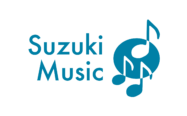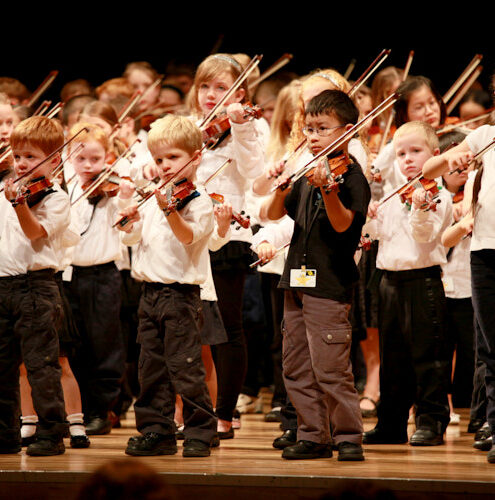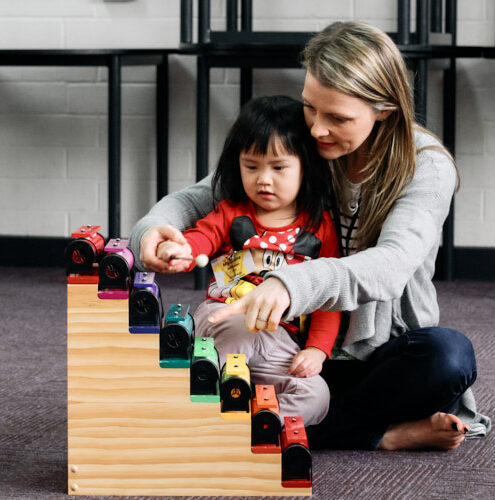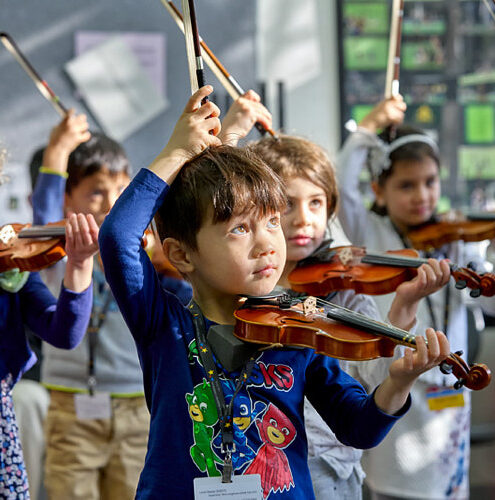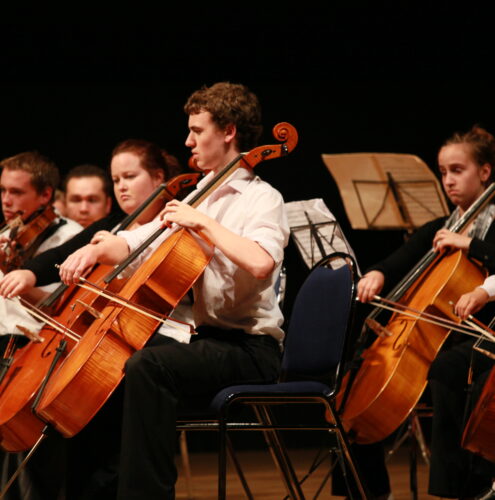Suzuki instrumental lessons are usually offered for children from 3 years of age upwards. Many students commence between the ages of 4 and 10; however, a student is never “too old” to learn through the Suzuki method. Lessons are always tailored to the individual student, so the approach for an older student will be different, and reading will most likely commence much earlier; however, the philosophy, the repertoire and family support remain essential elements.
Definitely – the method and repertoire are suitable for any age group. Parental involvement is still very beneficial for older beginners, although the older student would naturally be practising more independently. Many adults have also made a beginning, or returned to further their childhood studies, through Suzuki Method.
The parent is “the teacher at home”. They attend all lessons so that they can be guided by the teacher as to how to best help their child at home. They ensure that their child hears the Suzuki CD every day. Parents take notes at lessons and set aside regular time each day to practise with their child, to encourage them, make learning fun and to provide a musical environment in the home. Parents take their children to regular Suzuki concerts and events.
Parents attend all lessons to encourage their child and help them with daily practice. The parent and teacher work very closely together to ensure effective practice and the best possible progress for the child.
“Any child can learn.” This is one of the fundamental aspects of the Suzuki philosophy. Whether to proceed with Suzuki lessons is usually a matter of the desire of the parent. Suzuki lessons should only be commenced when the family is fully informed and aware of the Suzuki philosophy and the time commitment required by both the parent and the child. It is vital that the parent is very enthusiastic about the method as they will be investing a lot of time and energy over many years. It is not necessary for parents to have any prior knowledge of music, only a desire to learn and help their child.
Music is an expressive language – to understand and communicate through music, it is necessary to have it in the environment. A musician’s ability to listen can be equated to an artist’s ability to see. The Suzuki listening program provides students with a musical environment and context for the learning of their instrument. Regular listening develops rhythmical fluency and memory and an intuitive understanding of how to play “musically”, and provides a model for a beautiful tone.
The main benefits are the development of a musical ear. Students can hear their own playing more easily and focus on making a beautiful sound. Daily listening enables students to develop auditory memory and a sense of rhythmical flow and musicality in their playing. Students also consolidate good posture and excellent technique far more quickly when they are not simultaneously trying to decode written musical symbols. This produces a sense of confidence, ease and natural musicality more readily than beginnings based on reading.
Parents attend all lessons of Primary school age children and as appropriate for older beginners. It is quite common for parents to attend right through the Secondary school years. This is because there has been such a strong interest, involvement and friendship developed over the years between the teacher, parent and child, that everyone is happy for the parent to continue attending, even when they can no longer help with the daily practice.
Prospective parents would firstly need to talk with the Suzuki teacher who will give them introductory information about the Suzuki approach. The parent and child would then come to observe a Suzuki lesson. It is important to give plenty of time for both the child and the parent to be well-informed and set up for success from the very beginning. If the family is interested in commencing lessons, the Suzuki teacher may then suggest an induction process that may vary from teacher to teacher, but could include:
- observation of a few more private and group lessons
- designated reading material
- a series of introductory lessons for the parent or an extended period of
- lessons shared between the parent and child
- commencement of listening to the Suzuki CD before the first lesson.
Suzuki students usually commence a reading program when they are nearing the end of Suzuki Book 1, depending on their age. This may be at a time anywhere between 6 months and 3 years after commencing lessons, and depends on the age and development of the child. Reading is introduced when the child is ready, ie. has developed good posture, tone, musicality, technique and fluency throughout the Book 1 repertoire as well as sufficient eye-brain development to recognise nearly-exact differences and effective eye-tracking movements. There is not a specific Suzuki reading course. Students use a wide range of materials and learn to read in the same way as non-Suzuki students. The difference is that they can already play their instrument fluently and are learning to read the notation for the musical language they already “speak” and understand. It would be realistic to expect that a Suzuki student’s reading skill would have reached their playing level after 3 to 4 years of reading study, at which time they would normally be reading their Suzuki repertoire as well as listening to it on recordings. From this stage onwards, Suzuki students would continue to read both Suzuki and non-Suzuki material.
This can be compared with the proverbial question “how long is a piece of string”?! As a rough guide, depending on the child’s age, rate of learning, and commitment to practice, etc, it is possible (but rare) to complete Book 1 in 6 months, more usually between 1-4 years. Occasionally a student may take longer. There may be very good reasons for this, and it does not necessarily mean that future learning will progress at the same rate.
Review is a using the collection of pieces that have already been learnt to raise a students’ playing ability. Students continue to play familiar pieces while learning new ones and the repertoire of pieces that a child can play fluently continues to grow. Review is important because it is much easier to refine general musical and technical skills using material that is already familiar rather than with new pieces. The repertoire has been selected carefully so that the skills in new pieces are built on previous ones. A new piece may contain 80% familiar ideas and skills, so the learning of a new piece occurs more readily if the review is kept up- to-date. The student’s playing is generally more fluent and “natural” because of review, and a stronger capacity for memory is developed. Review is an essential part of the Suzuki program.
The observation period is important for the teacher and family to get to know each other. Observation enables the new family to become familiar with the style and format of the lessons and to make an informed decision before commencing lessons. The parent gains an understanding of their future role in the lessons and seeing other children learning is a good preparation for the child –it lets them know what to expect and they receive inspiration from seeing a lesson in action.
At first, 5-15 minutes each day may be sufficient. This gradually increases as the child progresses. After several years, the parent’s input gradually decreases. It is recommended that practice times be split into two shorter sessions per day, when possible.
Yes, however they are usually unnecessary. Suzuki students are encouraged to play in concerts, attend workshops and present for graduation and these activities provide ample structure and motivation. Suzuki teachers are trained to ensure students master each step as it is learnt – ‘never rushing, never resting’ – and this focus on fluency ensures the highest standards are maintained.
Suzuki students should only undertake exams under the recommendation and full support of their Suzuki teacher. For some children, preparing for an exam may compromise their aural, technical and musical development through the Suzuki program. It is best to consult your teacher and follow their advice. Many advanced Suzuki students achieve very highly as adults in both music and other fields without formal exams.
If the student is already reading fluently, there would be no difficulty in changing to traditional lessons. If the student doesn’t read yet, or has just begun reading, there would need to be careful communication between the teachers to ensure a smooth transition. The focus would most likely be shifted towards a reading approach, however, it would be recommended that the child continue to play at least a selection of their Suzuki repertoire until their reading has caught up with their playing level. This will enable the student to maintain their musical and technical skills and benefit from that sense of achievement while learning to read. In this way they will not need to feel as if they are “starting all over again”.
Suzuki is not just an approach for ‘young children.’ Most Suzuki students and their families are very committed and continue throughout secondary school. If there needs to be a change, it is usually because the parents can no longer meet the commitment of attending the lessons or the home practice of younger students.
Yes, provided that the family is fully informed of the philosophy and commitment. There may be differences in the way technique is taught, and the students and families would need to be patient in the early lessons while this is worked through.
Readiness is the most important factor when preparing for any concert. A child playing in their first concert should be confident enough to bow on their own, play their instrument unaided and present their performance with poise. Most children would be learning for at least 6 months before playing in their first concert, and should choose a piece they are very comfortable with to ensure a happy experience. Many teachers have informal studio gatherings where new beginners would play, or even just do a bow holding their instrument.
Without the Suzuki Association, there would be no trained Suzuki teachers. So having a Family Membership is the best way to contribute to the ongoing Professional Development of your teacher. Members have access to the full range of Suzuki events and graduations, both locally and internationally. These are a vital part of the learning process, providing a wider musical context, motivation, goals and supportive contact with other Suzuki students and families. Suzuki teachers plan their lessons around the many performing opportunities, concerts, festivals, group lessons, graduations and ensembles provided by Suzuki Music. The Association also provides information and support for parents to help their children.
Group lessons provide a strong motivational foundation for students and are a standard part of Suzuki instrumental lessons. Students learn and become more engaged by playing music together. Younger students are inspired by older ones, who in turn gain pride in their own progress. A common repertoire enables the students to easily play and learn together. Parents see the context for what is happening at home and gain the opportunity to exchange ideas for home practice. Piano group lessons are also very beneficial. The structure of these may vary from the other instruments due to the difficulty in obtaining venues with multiple pianos.
Suzuki students need to own a copy of the Suzuki CD (either physically or digitally) and Suzuki Book and to have access to a listening device at home. Pianists need an acoustic piano and not an electronic instrument. Success does not come readily from ‘fighting’ with an oversized or poor quality instrument, so students of violin, viola, cello, flute and guitar would be best advised by their teacher as to which size and make of instrument is appropriate. Cello and guitar students need an appropriate stool. Piano students usually need footstools (covered telephone books are ideal) and an adjustable piano stool so that they will be seated at the correct height throughout their years of playing.
Students would need to bring the following things to their lessons: their instrument, Suzuki books, reading/theory books as appropriate, a book for note-taking, and some teachers require a scrap book.
We aim, through the development of excellent musical skills, to develop character and sensitivity which will stand a person in good stead no matter what their ultimate path in life.
While Suzuki students are often observed playing from memory in large groups in unison (possible because of the common repertoire), this does not indicate unmusical playing. After all, in orchestras, large groups of string players play in unison without their individual musicianship being called into question. In fact, Suzuki students, when heard singly, all have their own individuality of tone, their own understanding of the music, their own personal expression. Frequently, a remarkable maturity of musical expression is observed in quite young children.
Only teachers who have completed specific Suzuki teacher training and are members of their local Suzuki Association are entitled to call themselves a Suzuki teacher. If you are unsure of a teacher’s qualifications ask them for more information, or check on the Teacher Directory of this or any other Suzuki Association.
Graduations are celebrations of student achievement placed at certain points through the repertoire. Certain pieces are designated as Graduation Levels. When students have studied beyond the piece for each level, and are playing to a high standard, and the teacher feels they are ready, students prepare a polished performance of the set piece and they graduate. They then receive a written report on their playing, and are presented with a Graduation Certificate.
The beautiful certificates, edged in gold, come from Japan and are screen printed from a painting done by Dr Suzuki himself.
Graduation is not an examination, and every child succeeds. Teachers present students only when they are certain that the performances are secure and musical and that the student is studying well beyond that particular level. To graduate is to achieve recognition for having reached a certain milestone in the ongoing process of musical education.
Graduation is not compulsory, however to graduate at any level beyond Level 1, a student must have graduated at all previous levels. More than one level may be presented on one occasion.
In Japan, all graduation performances are submitted as a recording. Currently in Victoria there is some degree of flexibility. Cello and flute graduations may be submitted as a recording or presented in a live performance on certain given dates. Pianists generally present a live performance, with two possible dates each year. Violin, viola and guitar graduations are recorded.
Piano students should practise on an acoustic piano, not an electronic instrument. This is because the Suzuki approach places great importance on tone production. There are technical differences between acoustic and electronic instruments and there are many musical and expressive effects inherent in piano playing that are not possible to achieve on an electronic instrument.
- Payment for lessons (how much and when to pay)
- Cancellation of lessons (e.g. for illness)
- Amount of notice required to cease lessons with the teacher
- Appropriate times and methods of contacting the teacher
- Appropriate behaviour during lessons
Why you will love
Suzuki Music
Lauren, a Suzuki Parent
“As a music teacher who learnt the “traditional” way, I only discovered what the Suzuki Method was all about when… “Lauren, a Suzuki Parent”
Matt, a Suzuki Student
“Suzuki teaches you more than just music. It teaches valuable discipline, time management and organisational skills that transfer to all… “Matt, a Suzuki Student”
Lindy, a Suzuki Parent
”So many things I loved about Suzuki! I loved the nurturing and respectful environment of the Suzuki community. I loved… “Lindy, a Suzuki Parent”
Yuko, a Suzuki Teacher
“It’s been a great musical and personal journey with my students since I started working as a Suzuki Method Piano… “Yuko, a Suzuki Teacher”
Angelina, a Suzuki Student
“This method is not just a music program, it’s a journey to remember. The carefully crafted volumes of repertoire have… “Angelina, a Suzuki Student”
Jim, a Suzuki Parent
“My daughter has been a Suzuki music student for seven years, since she was six, and it has become a foundation… “Jim, a Suzuki Parent”
Vicky, a Suzuki Parent
“A few years down the track of our Suzuki journey, it has become an integral part of our family life.… “Vicky, a Suzuki Parent”
Hanna, a Suzuki Teacher
“I’m in a special place to love the Suzuki method, as I both learned Suzuki piano from age 3 myself,… “Hanna, a Suzuki Teacher”
Haipei, a Suzuki Parent
“Our family loves Suzuki Events. It’s always fun because everyone plays the same piece together in a fun way. Instead… “Haipei, a Suzuki Parent”
Chloe, a Suzuki Student
“The first time that I heard piano was when I was a little four-year-old girl, listening to my friend play… “Chloe, a Suzuki Student”
Terrence, a Suzuki Student
“I have been learning piano with Suzuki Music since I was 3 years old. Suzuki recommends starting from a young… “Terrence, a Suzuki Student”
Crystal, a Suzuki Parent
“I feel very blessed to have Suzuki offer my daughters such a wonderful musical education! I think that I was… “Crystal, a Suzuki Parent”
Merry, a Suzuki Parent
“My journey as a parent with Suzuki Music has been fantastic. My two sons started learning piano at a very… “Merry, a Suzuki Parent”
Jason, a Suzuki Parent
“Our Family joined Suzuki Music in 2019. Firstly, based on our experiences, Suzuki not only provided our daughters a systematic… “Jason, a Suzuki Parent”
